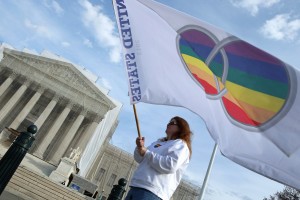Walker overturned Prop. 8 in August 2010, saying that it violated the federal constitutional guarantees of due process and equal protection under the law, garnering a win for same-sex couples.
"Proposition 8 fails to advance any rational basis in singling out gay men and lesbians for denial of a marriage license," Walker wrote in the ruling. "Indeed, the evidence shows Proposition 8 does nothing more than enshrine in the California Constitution the notion that opposite-sex couples are superior to same-sex couples."
Nonetheless, Walker ruled that same-sex marriages should not resume in California until Prop. 8 supporters had a chance to appeal.
PROP. 8 BACKERS APPEAL
The appeal got off to a rocky start in September 2010. Schwarzenegger, then-Lt. Gov. Abel Maldonado and then-Attorney General Jerry Brown declined to defend the same-sex marriage ban in court. Imperial County was the only government entity willing to defend the Prop. 8, though the court soon ruled it didn't have legal standing to intervene in the case. The California Supreme court, however, ruled that Prop. 8's proponents could defend the measure even though state officials declined to do so.
In February 2012, the 9th U.S.Circuit Court of Appeals in San Francisco upheld the district court's ruling, calling Prop. 8 unconstitutional.
PROP. 8 IN THE U.S. SUPREME COURT
Now, the battle has reached the U.S. Supreme Court. The justices heard oral arguments March 26. President Obama has urged the Supreme Court to overturn the same-sex marriage ban.
Oral arguments touched on a number of issues: whether or not Prop. 8 proponents have standing to bring the case, how to define marriage, if procreation is connected to marriage, and what the Constitution says.
As California takes the issue up to the Supreme Court, other states have blazed their own trail. Connecticut, Iowa, Maine, Maryland, Massachusetts, New Hampshire, New York, Washington, Vermont and Washington, D.C., allow gays and lesbians to marry. On the other side, 31 states have amended their constitutions to ban same-sex marriage.
There are multiple possible outcomes of the Prop. 8 case -- none of which will likely settle the issue for good. If the Supreme Court overturns Prop. 8, the decision could overturn all state bans on same-sex marriage—provided the high court says there is a fundamental right to marriage. However, the justices could also rule in such a way as to restrict the impact of their ruling to California, allowing other bans on same-sex marriage to stand.
If the Supreme Court upholds Prop. 8, the decision would not affect the laws in states that already allow same-sex marriage.
The justices could also decide the Prop. 8 proponents lacked standing to bring the case, which would vacate the Ninth Circuit court's decision and uphold Judge Vaughn Walker's ruling that Prop. 8 is unconstitutional. That decision could also leave the issue open to more appeals.
WHAT ABOUT DOMA?
The Supreme Court heard the arguments on the federal Defense of Marriage Act the day after Prop. 8 arguments. DOMA was signed into law by President Bill Clinton in 1996 to define marriage as between a man and woman. DOMA consequently denies legally married same-sex couples the federal benefits that are available to married opposite-sex couples. Clinton has since said he believes the law is unconstitutional.
Two hours of oral arguments touched largely on what constitutes equal protection under the Constitution, states' rights, and why the President chose not to uphold the law.
If the court upholds DOMA, not much will likely change. If the bill is ruled unconstitutional, the federal government will have to recognize the same-sex marriages performed in the states where it is already legal, giving those married couples all the same federal rights and benefits as opposite-sex married couples.
GAY MARRIAGE IN CALIFORNIA TODAY
While the cases were being decided, same-sex marriages have not resumed in California, but those performed in 2008 between the overturning of Proposition 22 and the passage of Prop. 8 are considered valid in the state. A Field Poll released last month found that 61 percent of likely voters now support same-sex marriage. That's the same percentage that voted against it just 13 years ago.
